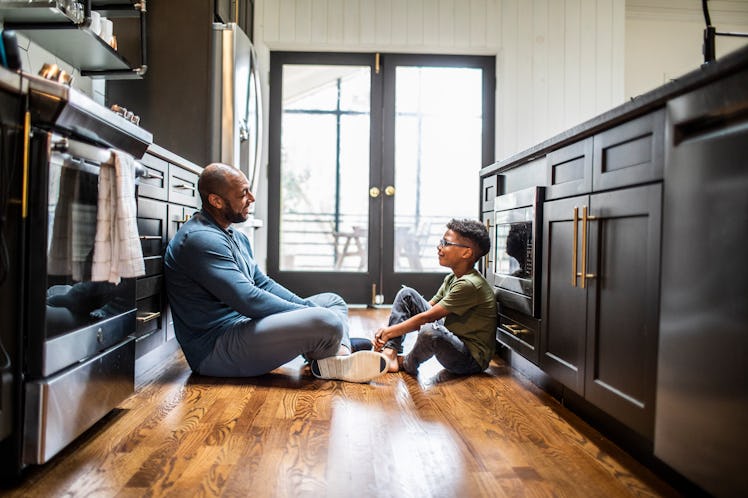How To Teach A Child To Understand ‘Bad Words’
Not every bad word is a swear, and what is considered a bad word can vary from family to family.

In the place of genuine swear words, parents often look to low-key curse word replacements. Many households might find “screwed” or “crap” harmless and only slightly edgier than other bad word replacements. Other families may not want to explain the concept behind an expression like “screwed” just yet. But once a child hits school age, it’s inevitable these words will enter a child’s lexicon. It can be tricky for a parent to explain the nuances of mild profanity without casting judgment on other families, but it can happen.
The place to start, according to Christi Garner, a marriage and family therapist, is with the general idea that all families are different. “I talk with kids about how we all come from different kinds of families,” says Garner. “These families all have rules that are different from ours. Our family might say that ‘fat’ or ‘crap’ is not okay to say, but at school or camp those words might be heard from other kids.”
The idea that different families have different rules is an idea that most parents will be familiar with, but it may be challenging for a child to process that information alone for the first time. Discussing it with kids can help them organize their feelings and thoughts about other people’s rules. It’s also a great opportunity for parents to learn what those thoughts and feelings are, suggests Garner.
“Ask them what they would do if they heard those kinds of words, and then keep talking after they answer,” Garner advises. “Always ask the kids what they think, before launching into your response. You can get so much good information about the ways they think if you let them tell their stories first.”
Maybe they think not being able to say the words is unfair; maybe they think the other kids seem cooler or more mature. Hearing what their children have to say about forbidden family words can help frame how parents explain why some kids can use certain bad words and others can’t. This explanation, just like the rules of the household, is different for each family, but there can be some real complications when it’s based on judgment or criticism of other families. Kids’ socialization can become difficult and good opportunities for developing emotional intelligence in the classroom or on team sports can be clouded when parents get judgmental.
“Instead of telling the kids they are bad for saying those things, remember their families are different from ours,” recommends Garner. “Something like ‘it is your choice if you want to stay and play with kids who talk in those ways, and you can always walk away if you don’t feel comfortable. It is important to know that just because they say them doesn’t mean they are bad people, but we choose to not say those at home or use them ourselves until you are adult and you can choose for yourself.’”
Chances are those kids will try out those choices long before adulthood. Kids don’t behave around their peers the same way they behave around their parents. It’s a fairly universal occurrence, which informs some of the most pivotal experiences of childhood, for good or ill.
How to Explain Mild Profanity to a Child
- Explain the rules of the house: Kids may be hearing a variety of language on the playground, but that doesn’t mean the rules have to be ambiguous to them. Remind them what is expected of them.
- They will encounter different rules: Every household is different, both in family composition and family rules.
- Ask them what they think: Asking kids what they think of that kind of language may reveal their personal level of comfort or ideas around propriety. Or else the whole conversation may make them uncomfortable.
- Reinforce the rules: Regardless if kids will hear these words from their peers, and regardless of the fact that good people may use these words, the family has their own expectations of proper behavior.
This article was originally published on